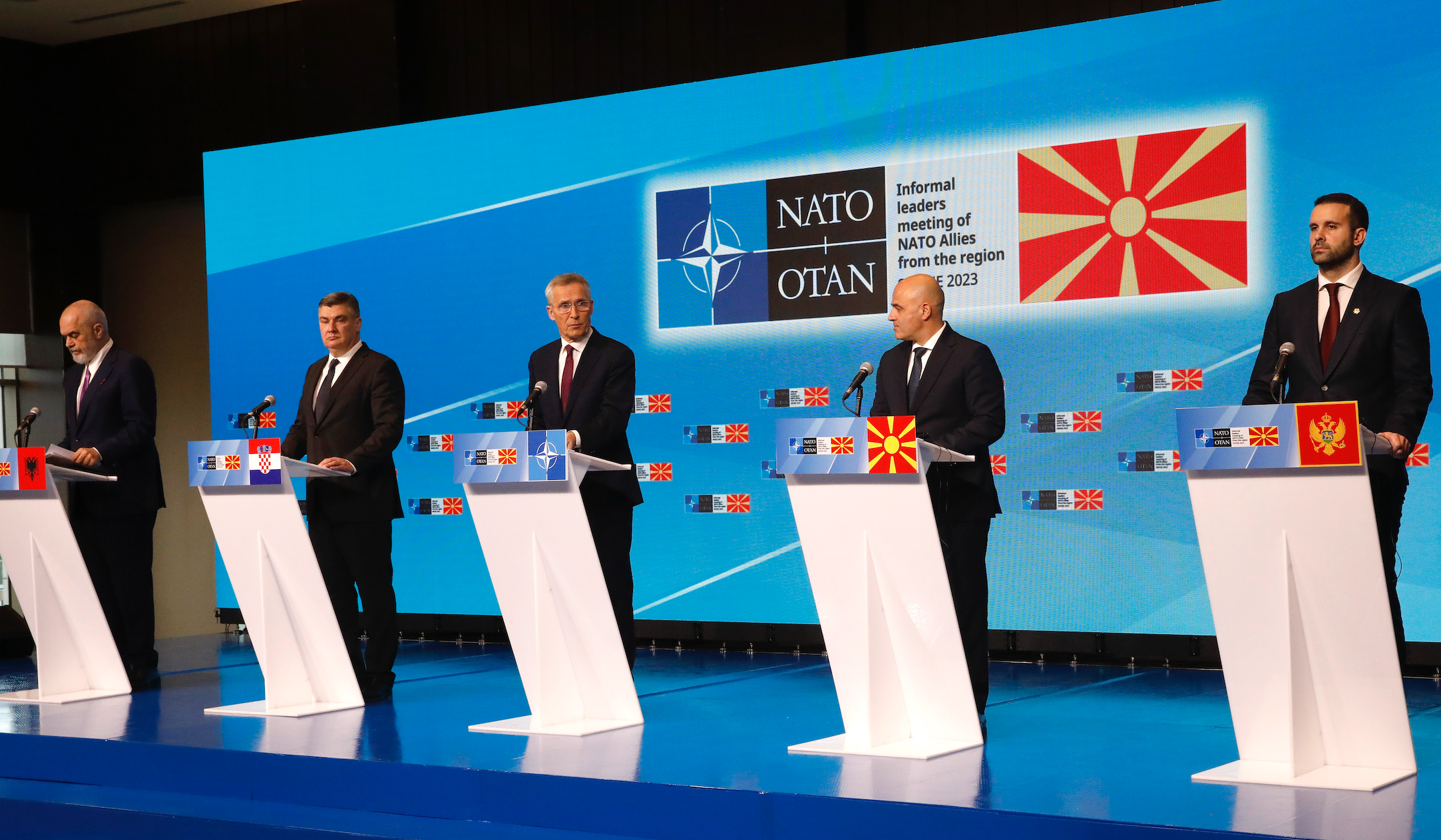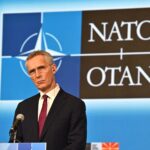NATO Secretary General Jens Stoltenberg said in Skopje that the Western Balkans region is of strategic importance to the Alliance, but there are reasons for concern. The NATO chief noted that during his visit to Sarajevo, Pristina, and Belgrade, he made it clear that stability in the Western Balkans depends on whether all parties choose dialogue and diplomacy over conflict and chaos. After visiting Bosnia and Herzegovina, Kosovo, and Serbia, the head of NATO arrived in North Macedonia, where, together with Prime Minister Dimitar Kovačevski, he organized an informal summit of the leaders of NATO members, which was attended by President of Croatia Zoran Milanović, Prime Minister of Albania Edi Rama, and Prime Minister of Montenegro Milojko Spajic in the presence of Prime Minister of Slovenia Robert Golob. Stoltenberg emphasized that the parties had discussed common security challenges in the Western Balkans. This region is of strategic importance to NATO, but there are reasons for concern, ne noted, adding that NATO sees separatist threats for Bosnia and Herzegovina, a fragile security situation in Kosovo, and stalled normalization between Belgrade and Pristina. In addition, authoritarian states such as Russia seek to undermine our democracies through cyber and hybrid threats, Stoltenberg emphasized.
The view of the situation on the part of Brussels is clear: an end to separatist rhetoric will promote stability and enable reforms in Bosnia and Herzegovina. Resuming engagement in the EU-facilitated dialogue is essential to Belgrade and Pristina’s path to peace and stability. Recent proposals to create a Union of Serbian Municipalities in Kosovo could be an important step forward. It is time to overcome regional conflicts that have been long been going on, Stoltenberg stressed, adding that he does not see any immediate military threat from Russia against any NATO ally or the region as a whole. At the same time, he admitted that NATO remains vigilant, carefully monitoring what the Russian Federation is doing, adding that the Alliance will remain united. The statement came in response to a journalist’s question on the recent statement by Ukrainian President Volodymyr Zelensky who said Ukraine has intelligence that Russia has a plan of military destabilization of the Balkans. The NATO Secretary General recalled that NATO retains military presence in the region in the form of KFOR, headquarters in Sarajevo, and an office in Belgrade, and the Alliance is ready to quickly activate its troops and do everything possible to protect any ally from any threat. In addition, Stoltenberg recalled that the Alliance continues to repeat to Russia that it should refrain from aggressive actions against its neighbors and stop the war of aggression against Ukraine. It must respect international law because every nation has the right to choose its own path. One of the reasons that Russian President Putin went to war against Ukraine, according to the NATO chief, was that he did not want Ukraine to join the Alliance, so that NATO would ensure that there would be no further expansion and withdraw all its forces from its eastern flank. But Putin gets the exact opposite. NATO is getting larger, the presence in the eastern part of the Alliance is growing, and new NATO members – Finland and Sweden – have also emerged. This is a serious strategic defeat for President Putin, which shows that attacking Ukraine was a big mistake. Stoltenberg called on all parties to continue to support Ukraine. He recalled statements from Germany and the USA about strengthening military support for Ukraine, adding that the Alliance will continue to help Ukraine defend itself and its right to self-defense against Russian aggression.
At the summit, Prime Minister Kovačevski emphasized that North Macedonia and other NATO member states are fighting against Russian influence in the region. “We are a NATO country, and I assure you that the institutions are doing their job. And let’s not forget that all subjects and political actors are obliged to contribute to general peace and stability,” he said. Undoubtedly, the influence of third countries, including the influence of Russia, does exist in the region, and they can always find like-minded people in certain political parties or organizations. “However, they are not even close to what our institutions possess, what NATO member states possess, and what our security services possess in order not give them an opportunity to destabilize our country and region in any way,” Kovačevski emphasized.
However, Albanian Prime Minister Edi Rama did not think that the situation in the Western Balkans was under control, and asked to send in additional NATO troops to Kosovo. He believes that this will guarantee the security and integrity of Kosovo. Rama recalled that despite calls for an increase in troops to guarantee the stability and absolute integrity of Kosovo, a tragic act occurred that should be seen as a warning, not a sporadic case, and which should not be allowed to repeat under any circumstances, Rama said. adding that the border between Kosovo and Serbia is out of control and is being used for arms and drug trafficking. And what happened in Banjska only indicates a high risk of destabilization and escalation.
It should be noted that, in general, challenges related to regional security in the Western Balkans were discussed at the summit. They are really significant. All the participants in the event were of the same opinion that the situation in Bosnia and Herzegovina and Kosovo is most disturbing. In Bosnia and Herzegovina it is the activity of President of Republic of Srpska, Milorad Dodik, aimed at the disintegration of the country and the implementation of the policy of secessionism, and in Kosovo, it is the situation in the north of the country, where the Serbian minority prevails and over which radical forces are trying to incite a conflict with the aim of escalation and development into a major war between Serbia and Kosovo. By and large, neither Belgrade nor Pristina want this scenario to develop. But Moscow is interested in the armed conflict and, through its influence on chauvinistic Serbian politicians and pro-Russian public organizations, is trying to foment escalation, up to an armed one.
The Kremlin dreams of another conflict in the center of Europe, which, according to their desired scenario, should turn into a full-scale war. This will significantly divert NATO and EU’s attention and resources from Russian aggression against Ukraine. Republika Srpska, or rather its president and his political allies, is a certain battering ram in the effort to destroy the regional security system. Moscow wants to create a destabilizing fork in the region, involving Bosnia and Herzegovina and northern Kosovo. Although the NATO Secretary General does not see the threat of a direct armed conflict in the region, these are rather simply the words to calm public opinion. Events in Israel show that a blow can be delivered by terrorists really quickly, unexpectedly, and painfully for the other side. The world-renowned Israeli intelligence services and those of NATO member turned out to have missed the initial strike in the making. The president of Ukraine simply drew the attention of the international community to the painful problems existing in the region. It is much easier to take preventive steps, including at the request of the Albanian Prime Minister Edi Rama, to significantly strengthen NATO’s military presence in Kosovo than to calm the situation with diplomatic and political measures. When the border conflict turns into an armed one, then it will be quite difficult to put out the fire. The turbulent history of the Western Balkans only confirms this assumption.



